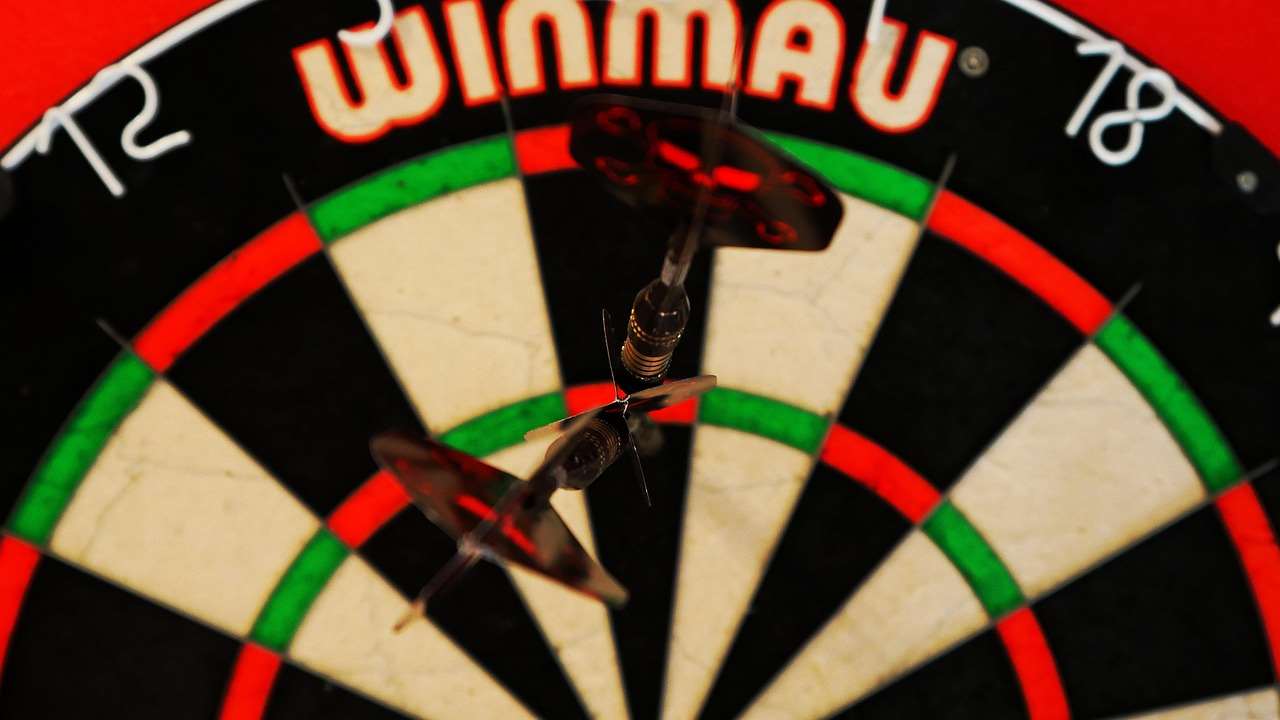The darts best score achievable in a single visit to the oche is 180 – hitting three treble 20s. In this comprehensive guide, we’ll explore the science, skill, and strategy behind achieving this impressive feat, as well as discuss other high scores, checkout combinations, and tips to improve your game.
⚠️ Still Using Pen & Paper (or a Chalkboard)?! ⚠️
Step into the future! The Dart Counter App handles all the scoring, suggests checkouts, and tracks your stats automatically. It's easier than you think!
Try the Smart Dart Counter App FREE!Ready for an upgrade? Click above!
Understanding the Darts Best Score: The Perfect 180
The allure of the darts best score is undeniable. Hearing the roar of the crowd after a perfect 180 is a feeling many darts players strive for. But what makes this score so special?
- Maximum Points: Hitting the highest possible score in a single turn demonstrates exceptional accuracy and consistency.
- Game-Changing Potential: A well-timed 180 can drastically shift the momentum of a match.
- Prestige: It’s a mark of skill that earns respect from fellow players and fans alike.

While the elusive 180 is the dream of many players, achieving it requires a combination of natural talent, dedicated practice, and a solid understanding of dart mechanics.
The Anatomy of a 180
A 180 consists of three darts all landing in the treble 20 segment of the dartboard. The treble 20 is a small section, making it a challenging target. The board is arranged such that either side of the 20 is the 1 and the 5, meaning that even a small inaccuracy could result in an inferior score.
To consistently aim for and achieve the treble 20, players must master the following aspects of dart throwing:
- Grip: A consistent and comfortable grip is crucial for control.
- Stance: A stable stance provides a solid foundation for throwing.
- Throwing Motion: A smooth, repeatable throwing motion minimizes errors.
- Release Point: Releasing the dart at the correct moment is essential for accuracy.
- Follow-Through: A proper follow-through ensures the dart travels in the desired trajectory.
Beyond the 180: High Scores and Checkout Strategies
While the darts best score is the ultimate goal for many, other high scores and strategic checkouts are equally important for winning matches. Understanding how to maximize your scoring potential in every visit to the oche is key to success.
Another important aspect of high scores and checkout strategies is knowing when to switch targets. Some players become overly fixated on hitting the treble 20. If a player misses a few times, then switching to treble 19, or another target may be the correct strategic choice.
Common High Scores in Darts
Besides the 180, several other scores are considered impressive and can significantly impact a game:
- 177: Two treble 20s and a treble 19.
- 174: Three treble 19s.
- 171: Two treble 20s and a bullseye (50 points).
- 160: Treble 20, Treble 20, Double 20.

Checkout Combinations and Strategy
Finishing a leg of darts often requires strategic planning and careful consideration of checkout combinations. The goal is to reduce your score to zero using a double. Common checkout numbers and strategies include:
- 170: T20, T20, Bullseye (the highest possible checkout).
- 167: T20, T19, Bullseye (very rare, but possible).
- 164: T20, T18, Bullseye.
- 161: T20, T17, Bullseye.
- 40: Double 20 (often used as a fallback when a higher checkout is missed).
Knowing multiple checkout routes is crucial. Being able to adjust your strategy based on where your darts land is the mark of a skilled player. Having a good darts scoring program free download can help you become skilled at checkout routes.
Tips to Improve Your Darts Score
Improving your darts best score and overall game requires dedication and a focused approach. Here are some practical tips to help you enhance your skills:
Practice Drills for Accuracy
Consistent practice is the cornerstone of improvement. Focus on specific drills to refine your accuracy and consistency:
- Treble 20 Challenge: Aim for the treble 20 repeatedly, tracking your progress and identifying areas for improvement.
- Around the Clock: Start at number 1 and work your way around the board, hitting each number in sequence.
- Doubles Practice: Focus on hitting doubles, as they are crucial for finishing legs.
Equipment and Setup Considerations
Your equipment and setup can significantly impact your performance. Consider the following:
- Dart Weight and Grip: Experiment with different dart weights and grips to find what feels most comfortable and provides the best control.
- Dartboard Setup: Ensure your dartboard is properly mounted at the correct height (5’8″ to the bullseye) and distance (7’9 1/4″ from the oche). Also, make sure the board is well lit.
- Flights and Shafts: Try different flights and shafts to optimize the dart’s trajectory and stability.
Also ensure that the dartboard is in good condition. A worn-out dartboard can deflect darts and lead to inconsistent scoring. Consider different darts holder ideas for your darts.
Mental Game and Focus
The mental aspect of darts is often overlooked, but it plays a critical role in your performance. Maintain focus and composure, especially under pressure:
- Visualization: Before each throw, visualize the dart hitting your target.
- Deep Breathing: Use deep breathing techniques to calm your nerves and improve focus.
- Positive Self-Talk: Encourage yourself with positive affirmations and avoid negative thoughts.
Learning to manage distractions and maintain a positive attitude can significantly impact your ability to perform consistently. The mental game is as important as physical skill when chasing a high score, such as the Free dart score app.
Analyzing Professional Darts Players
Studying the techniques and strategies of professional darts players can offer valuable insights and inspiration. Observing how they approach the game can help you refine your own skills and develop a winning mindset.
Key Techniques Used by Professionals
Professional darts players exhibit a range of advanced techniques that contribute to their success:
- Consistent Stance and Grip: Professionals maintain a remarkably consistent stance and grip, ensuring minimal variation in their throws.
- Smooth Throwing Motion: They employ a fluid, repeatable throwing motion that maximizes accuracy and power.
- Strategic Checkout Planning: Professionals meticulously plan their checkouts, considering multiple routes and adapting to changing circumstances.

Learning from their Strategies
Beyond technique, professionals also employ strategic approaches that can be emulated by aspiring players:
- Target Prioritization: They prioritize targets based on their score, the remaining checkout, and the likelihood of success.
- Risk Management: Professionals carefully weigh the risks and rewards of each throw, avoiding unnecessary gambles.
- Adaptability: They adapt their strategy in response to their opponent’s performance and the changing dynamics of the match.
Watching professional matches and analyzing their gameplay can provide valuable lessons for improving your own darts game. Remember to focus on understanding *why* they make certain decisions, not just *what* they do. Think about the shot zen jutsu darts.
The Role of Technology in Darts Scoring
Technology has revolutionized various aspects of darts, including scoring and performance analysis. Automated scoring systems and tracking tools provide players with valuable data and insights to improve their game.
Automated Scoring Systems
Gone are the days of manual scorekeeping. Automated scoring systems offer several advantages:
- Accuracy: They eliminate human error and ensure precise scorekeeping.
- Efficiency: They streamline the scoring process, allowing players to focus on their throws.
- Data Analysis: They provide detailed data on each player’s performance, including averages, checkout percentages, and target accuracy.
Performance Tracking and Analysis Tools
Advanced tracking tools offer in-depth analysis of various aspects of your game:
- Dart Trajectory Analysis: These tools track the trajectory of each dart, providing insights into your throwing motion and release point.
- Target Accuracy Mapping: They map your dart groupings on the board, revealing areas of strength and weakness.
- Statistical Analysis: They provide comprehensive statistical analysis of your performance, including scoring averages, checkout rates, and darts best score frequency.
By leveraging technology, players can gain a deeper understanding of their game and identify areas for improvement. Just think about the trebles less visits.

Conclusion
Achieving the darts best score of 180 is a testament to skill, practice, and mental fortitude. While the perfect score may be elusive, understanding the mechanics, strategies, and mental aspects of darts can significantly improve your overall game. Remember to focus on consistent practice, proper equipment setup, and maintaining a positive mindset. By applying the tips and techniques discussed in this article, you can elevate your game and chase your own personal darts best score. Now, pick up your darts, head to the oche, and start practicing!
Hi, I’m Dieter, and I created Dartcounter (Dartcounterapp.com). My motivation wasn’t being a darts expert – quite the opposite! When I first started playing, I loved the game but found keeping accurate scores and tracking stats difficult and distracting.
I figured I couldn’t be the only one struggling with this. So, I decided to build a solution: an easy-to-use application that everyone, no matter their experience level, could use to manage scoring effortlessly.
My goal for Dartcounter was simple: let the app handle the numbers – the scoring, the averages, the stats, even checkout suggestions – so players could focus purely on their throw and enjoying the game. It began as a way to solve my own beginner’s problem, and I’m thrilled it has grown into a helpful tool for the wider darts community.